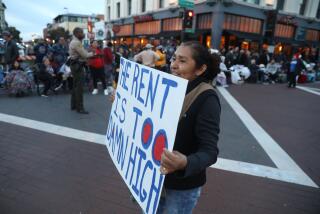Wealth of nearly all Americans fell after the recession
WASHINGTON — The richest 7% of American families saw their average wealth soar 28% from 2009 to 2011, while the remaining households lost 4% of their net worth over the same period, according to a new report.
The analysis of Census Bureau data by the Pew Research Center draws on the most recent statistics on wealth. The findings throw into stark relief the dramatically uneven nature of the recovery.
The economy officially emerged from recession in mid-2009, and since then, affluent families have benefited handsomely from recovering stock prices and surging gains in bonds.
The report found that the average wealth of the upper 7% of households jumped to $3.17 million in 2011 from $2.48 million two years earlier, thanks largely to the strengthening stock market. Six out of 10 households with a net worth — assets minus debts — of $500,000 or more owned stocks and mutual funds in 2011.
Most of the wealth of the remaining 93%, however, has been tied up in homes, and the values plummeted both during and after the Great Recession and only recently have been climbing. Only 13% of the households owned stocks and bonds, and their average wealth dipped to $133,817 from $139,896.
The housing market, though recovering, has not grown nearly as fast as stocks and other financial assets. And that means the country’s wealth gap is likely to have widened further in the last 16 months.
“This recovery is sort of unique in that the housing market, rather than leading, has lagged,” said Richard Fry, a coauthor of the Pew report.
This Census data set is not used as much by scholars as the Federal Reserve’s Survey of Consumer Finances, which compiles comprehensive statistics on the financial health of U.S. families every three years. But the Fed’s latest data are for 2010, making it difficult to assess the magnitude of the wealth gains made in the recovery.
Edward Wolff, an economist at New York University who has written extensively on wealth distribution, said the new Pew report is helpful in understanding how “very sensitive wealth is to the housing market.”
Close to two-thirds of U.S. households own their homes. But of more concern than un-recovered home values, Wolff said, is the stagnant incomes of Americans.
Economists attributed the varying recovery in wealth partly to Fed policies that supported gains in stock and bond markets. “The Fed has kept things pretty good for the wealthy,” Wolff said.
Fed officials have stated that their stimulus policies are aimed at promoting economic and job growth that also would benefit families with lower income and wealth.
But Sarah Raskin, a Fed governor, said in a speech last week that given the long-running trends of income and wealth inequality, “it is unlikely that cyclical improvements in the labor markets will do much to reverse these trends.”







